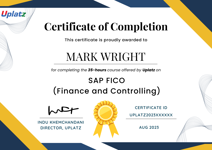- Uplatz Certificate of Completion - Free
Bundle Combo - SQL Programming (with Microsoft SQL Server and MySQL)
Uplatz
Self-paced videos, Lifetime access, Study material, Certification prep, Technical support, Course Completion Certificate
Summary
Overview
Certificates
Uplatz Certificate of Completion
Digital certificate - Included
Course Completion Certificate by Uplatz
Course media
Description
SQL Programming with MS SQL Server - Course Syllabus
Introduction to Microsoft SQL Server
Select and Where
SQL Sub Languages - Order By Clauses
Any - All - Select Into - Insert Into - Case
Delete - Top - Aggregate Functions - Wild Cards
Insert - Update - Is Null Commands
In - Between - Table Alias
SQL Comments - SQL Operators
Joins
Union All - Union - Group By - Having - Exists - Not Exists
Null Functions - Transact SQL
Examples - If - Conditional Statements
Goto Statement - Looping Construct
Sub Programs - Stored Procedures
Stored Procedure Examples
Modifying and Dropping a Stored Procedure
Dynamic Queries - Procedure Returning Values - Functions
Break - Continue - Exception Handling
Structured Exception Handling
Multiple and Nested Try Catch Blocks
Using Anonymous Block - Table Valued Functions
Backup DB - Differential Example - DDL Statements
User Defined DB - Creating DB with GUI - Query - Commands
Database Constraints and Domain Integrity Constraints
Primary Key and Composite Key
Creating 1-to-1 Relationship - Indexes
Views and Types of Views
Auto Increment - SQL Date Operations
Hosting
SQL Programming with MySQL - Course Syllabus
1. Basics of Databases
Data Models and basic terminologies
Advantages and disadvantages of DBMS
2. SQL Basic Understanding
What is SQL?
What SQL Can do?
SQL Process
ACID Properties
What is ER Model?
Best Practices
Database Normalization
3. Introduction to SQL
SQL Commands
SQL Constraints
Types of Keys
MySQL Hands-on
4. SQL Basic Commands with demonstration
5. Basics and Aggregation Functions
6. Regular Expression Functions
7. SQL Comparison Clauses
exists
not exists
create table like
case when
NULL Functions
8. SQL String Functions
9. SQL Numerical Function
10. Introduction to Date Functions
11. SQL Joins – Introduction and demonstration
12. Introduction MySQL Workbench
13. Stored Procedures and Views
Who is this course for?
Everyone
Requirements
Passion & determination to achieve big goals in life!
Career path
- Data Engineer
- Data Analyst
- Data Scientist
- Database Developer
- Application Developer
- Software Engineer
- Database Administrator (DBA)
- SQL Programmer
- Business Intelligence (BI) Developer
- Software Developer
- Systems Analyst
- IT Consultant
- Data Consultant
- Cloud Engineer
Questions and answers
Currently there are no Q&As for this course. Be the first to ask a question.
Reviews
Currently there are no reviews for this course. Be the first to leave a review.
Sidebar navigation
Legal information
This course is advertised on Reed.co.uk by the Course Provider, whose terms and conditions apply. Purchases are made directly from the Course Provider, and as such, content and materials are supplied by the Course Provider directly. Reed is acting as agent and not reseller in relation to this course. Reed's only responsibility is to facilitate your payment for the course. It is your responsibility to review and agree to the Course Provider's terms and conditions and satisfy yourself as to the suitability of the course you intend to purchase. Reed will not have any responsibility for the content of the course and/or associated materials.
FAQs
Interest free credit agreements provided by Zopa Bank Limited trading as DivideBuy are not regulated by the Financial Conduct Authority and do not fall under the jurisdiction of the Financial Ombudsman Service. Zopa Bank Limited trading as DivideBuy is authorised by the Prudential Regulation Authority and regulated by the Financial Conduct Authority and the Prudential Regulation Authority, and entered on the Financial Services Register (800542). Zopa Bank Limited (10627575) is incorporated in England & Wales and has its registered office at: 1st Floor, Cottons Centre, Tooley Street, London, SE1 2QG. VAT Number 281765280. DivideBuy's trading address is First Floor, Brunswick Court, Brunswick Street, Newcastle-under-Lyme, ST5 1HH. © Zopa Bank Limited 2026. All rights reserved.

